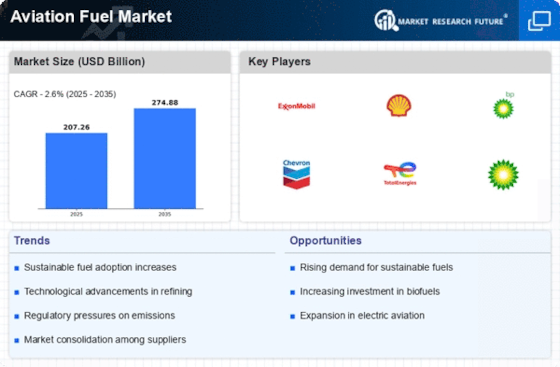Top Industry Leaders in the Aviation Fuel Market

Strategies Adopted: Key players in the Aviation Fuel Market deploy various strategies to maintain market leadership and drive growth. These strategies include:
Supply Chain Optimization: Companies optimize their supply chains, storage facilities, and distribution networks to ensure timely delivery of aviation fuel to airports and aviation hubs, reducing logistics costs and enhancing operational efficiency.
Technological Innovation: Continuous investment in research and development enables companies to develop advanced refining processes, fuel additives, and biofuels that improve fuel efficiency, reduce emissions, and comply with environmental regulations.
Strategic Partnerships: Collaborative partnerships with airlines, aircraft manufacturers, airports, and regulatory agencies enable companies to develop customized fuel solutions, support sustainability initiatives, and expand market reach through joint marketing and distribution agreements.
Geographic Expansion: Companies focus on expanding their presence in emerging markets with high growth potential, such as Asia-Pacific and the Middle East, through acquisitions, joint ventures, and strategic alliances with local fuel suppliers and distributors.
Companies Covered
Air BP Limited (UK)
World Energy (US)
Chevron Corporation (US)
Exxon Mobil Corporation (US)
Gazprom Neft PJSC (Russia)
Honeywell International Inc. (US)
Indian Oil Corporation Ltd. (India)
Shell International BV (Netherlands)
Total (France)
SkyNRG (Netherlands)
Factors for Market Share Analysis: Several factors influence market share in the Aviation Fuel Market, including:
Refinery Capacity: Companies with large-scale refineries and production facilities have a competitive advantage in terms of economies of scale, production efficiency, and cost competitiveness, enabling them to capture a larger share of the market.
Quality and Reliability: The quality, reliability, and consistency of aviation fuel supplied by companies influence purchasing decisions by airlines and aviation operators, with suppliers offering high-quality, ASTM (American Society for Testing and Materials) certified fuels gaining preference.
Pricing and Contract Terms: Competitive pricing, transparent pricing mechanisms, and flexible contract terms such as volume discounts, hedging options, and fuel price indexation play a crucial role in securing long-term contracts and maintaining customer loyalty.
Regulatory Compliance: Compliance with aviation fuel specifications, safety standards, and environmental regulations, including ASTM D1655 and DEF STAN 91-91, is essential for gaining market share and ensuring regulatory approval for fuel supply contracts.
New and Emerging Companies: In addition to established players, new and emerging companies are entering the Aviation Fuel Market, bringing innovative technologies and alternative fuel solutions. Some notable new entrants include:
Neste Corporation
Gevo, Inc.
Velocys plc
LanzaJet Inc.
Fulcrum BioEnergy, Inc.
Red Rock Biofuels
SkyNRG
World Energy
SG Preston Company
REG Synthetic Fuels
Industry News and Current Investment Trends: Recent developments and investment trends in the Aviation Fuel Market reflect a growing focus on sustainability, alternative fuels, and digitalization. Key highlights include:
Sustainable Aviation Fuel (SAF) Production: Increasing investment in SAF production facilities and biofuel refineries to meet growing demand for low-carbon aviation fuels and reduce the carbon footprint of air travel.
Digital Fuel Management Solutions: Adoption of digital fuel management platforms, data analytics, and predictive maintenance tools to optimize fuel efficiency, reduce fuel consumption, and lower operating costs for airlines and aviation operators.
Regulatory Mandates: Implementation of regulatory mandates and incentives, such as CORSIA (Carbon Offsetting and Reduction Scheme for International Aviation) and tax credits for biofuel producers, to promote the use of sustainable aviation fuels and reduce greenhouse gas emissions from aviation.
Overall Competitive Scenario: The Aviation Fuel Market is characterized by intense competition, technological innovation, and regulatory scrutiny. Established players with extensive infrastructure, global reach, and strong customer relationships maintain market leadership, while new entrants disrupt the market with alternative fuel solutions and digital technologies. As the aviation industry evolves and adopts sustainable practices, companies that prioritize innovation, sustainability, and customer collaboration will remain competitive in the dynamic landscape of the Aviation Fuel Market.
Key Developments
In July 2019, Gazprom Neft PJSC entered into an agreement with Air France KLM to provide refueling services to the latter’s scheduled flights at the Nikola Tesla Belgrade International Airport in Serbia.
In June 2019, SkyNRG and the Bernal Institute at the University of Limerick, Ireland, signed a memorandum of understanding (MoU) to develop a sustainable aviation fuel supply chain in Ireland. The MoU is projected to enable the company to strengthen its presence in the aviation fuel market in Ireland.
In February 2019, Gazprom Neft PJSC entered into an agreement with Aeroflot to provide refueling services at the Baiyun International Airport in Guangzhou, China.











